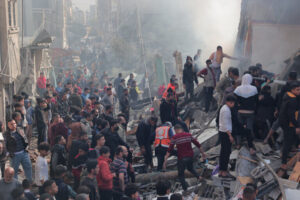Memories of a Gaza first responder

First responders and civilians look for survivors amid the rubble of destroyed buildings following Israeli bombardment in Rafah, southern Gaza, 14 December 2023
Mustafa Al-Jarou writes in Mondoweiss on 20 January 2025:
Editor’s Note: This reflection was written before the announcement of a ceasefire in Gaza on January 15, 2025.
I was born and raised in Gaza City in the neighborhood of al-Shuja’iyya, where I learned from a young age to serve my community. I would volunteer with the Red Cross and participate in first aid training courses. I was also a social researcher with local associations in Gaza that were assisting poor families by providing healthcare services or financial aid. Despite losing everything I owned in this war, I have not lost my volunteering spirit or my passion for helping others.
Before the war, life was stable. We had a routine life here in Gaza, just like anyone else in the world — work, studies, hobbies, friends and family. Everything changed with the war. Now there is no work, no education, and even stepping outside is impossible. Nowhere is safe. All we can do is count the days, waiting for a ceasefire to come into effect and for a permanent end of hostilities.
When the war began in October 2023, I joined the search and rescue team in al-Shuja’iyya. Our primary mission is to retrieve the injured from under the rubble and move them to safety after Israeli bombardments or attacks. Unfortunately, we often only recover dead bodies instead of survivors.
There are many of us who jump into action whenever a bomb strikes, whose names you will never know. First responders who work with minimal resources, sometimes in groups, sometimes alone, without any advanced equipment to assist us in handling these complex tasks. Despite this, we do what we can.
Every moment leaves unforgettable images in my mind: destroyed homes, women standing broken beside the remnants of their homes, barefoot children running through the rubble searching for their toys, and elders raising their hands to the heavens, pleading for mercy. These scenes, despite their harshness, are what push me to keep going.
‘Uncle, I’m alive’
One night in February 2024, we experienced one of the most harrowing moments of the war. We were huddled in a small room as explosions roared around us, sounding like relentless rainfall. But it wasn’t raining — it was Israeli bombs, burning everything in sight. The explosions were so close that I felt my heart would leap out of my chest from fear. Shelling went on for ten minutes that felt like an eternity.
When it finally stopped, we ventured outside to check on our neighbors. What we found was beyond devastating. Where was the Hassanin family? Where were the Mashharawis? Their homes were completely leveled, and there was no sign of life.
We began searching through the rubble, calling out the names of those we knew: “Ali! Ahmad! Khalil! Is anyone here? Can anyone hear us?” Suddenly, a faint voice emerged from the debris: “Uncle, I’m alive… Please get me out… I’m scared.”
I couldn’t wait for rescue equipment to arrive. I started digging with my bare hands, ignoring the rubble and shrapnel scratching and cutting me open. Eventually, I managed to pull out a child — Mahdi Adas, the sole survivor of three families that were annihilated on Shuja’iyya Street.
That night left a deep scar on my soul. The lack of tools made it impossible for us to reach the bodies of some of the martyrs trapped under the rubble.
